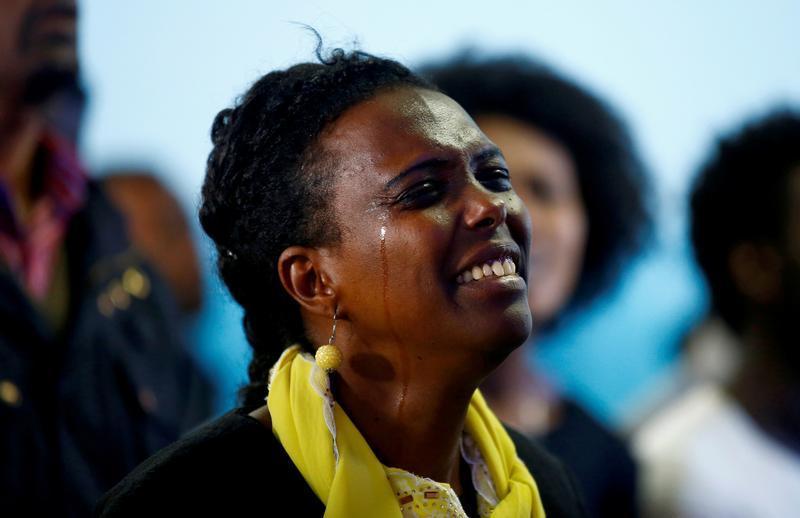(Nairobi) – An Ethiopian government directive under a state of emergency contains overly broad
and vague provisions that risk triggering a human rights crisis, Human Rights
Watch said today in a legal analysis. The government should promptly repeal or revise
all elements of the directive that are contrary to international law.
A woman cries as she attends a prayer session at Biftu Bole Lutheran Church during a prayer and candle ceremony for those who died in the town of Bishoftu during Ireecha, the thanksgiving festival for the Oromo people, Addis Ababa, Ethiopia, October 9, 2016.
© REUTERS/Tiksa Negeri
On
October 9, 2016, the government
announced a six-month state of emergencyfollowing
the destruction
of some government buildings and private property by
demonstrators. Over the past year, security forces have killed hundreds of
protesters and detained tens of thousands in two regions where there have been
numerous protests over government policies.
“Ethiopia’s state of emergency bans nearly all speech that the
government disagrees with anywhere in the country for at least six months,”
said Felix Horne,
senior Africa researcher at Human Rights Watch. “The state of emergency hands
the army new sweeping powers to crack down on demonstrators, further limiting
the space for peaceful dissent.”
Under the new state of emergency, the army can be deployed
country-wide for at least six months. The implementing directive prescribes
draconian restrictions on freedom of expression, association, and assembly that
go far beyond what is permissible under international
law and signal an increased militarized response to the situation.
The directive effectively codifies many of the security forces’ abusive tactics
that Human Rights Watch has documented since
the protests began.
The directive includes far-reaching restrictions on sharing
information on social media, watching diaspora television stations, and closing
businesses as a gesture of protest, as well as curtailing opposition parties’
ability to communicate with the media. It specifically bans writing or sharing
material via any platform that “could create misunderstanding between people or
unrest.”
It bans all protests without government permission and permits
arrest without court order in “a place assigned by the command post until the
end of the state of emergency.” It also permits “rehabilitation” – a euphemism
for short-term detention often involving physical punishment. Many of these
restrictions are country-wide and not limited to the two of Ethiopia’s nine
regions where most of the unrest took place.
Under international law, during a state of emergency a
government may only suspend certain rights to the extent permitted by the
“exigencies of the situation.” Many of the measures, including the restrictions
on freedom of expression, assembly, and association go far beyond what is
permitted under international law.
The government reports that since the state of
emergency began, 1,600 people have been arrested, including about
50 for closing their businesses. Human Rights Watch also has
received unconfirmed reports of unlawful killings, mass arrests, and looting of
houses and businesses by the security forces. There have been some armed
clashes between security forces and unidentified groups. Mobile phone access to
the internet has been blocked since October 5. Addis Standard, a monthly English
language magazine and one of the few independent publications left in Ethiopia,
announced on October 25 that it was halting publication of its print edition
due to state-of-emergency restrictions.
Large-scale, and mainly peaceful anti-government protests have
been sweeping through Oromia, Ethiopia’s largest region, since November 2015,
and the Amhara region since July 2016. Ethiopian security
forces have killed more than
500 people during protests over the last year. These protests
occurred in a context of the near-total
closure of political space.
Protesters have voiced a variety of concerns, including issues
related to development, the lack of political space, the brutality of the
security forces, and domination of economic and political affairs by people
affiliated with the ruling party. The emergency measures send a strong and
chilling message that rather than dealing with expressed grievances and
ensuring accountability for violence by both government forces and protesters,
the government will continue and probably escalate the militarized response.
On October 2, in Bishoftu, a town 40 kilometers southeast of the
capital, Addis Ababa, tensions ignited
at the annual Irreecha festival – an important Oromo cultural
event that draws millions of people each year. Security forces confronted huge
crowds with tear gas and fired shots and scores of people then died during a
stampede. Since then, alleged demonstrators have damaged a
number of government buildings and private businesses perceived to be close to
the ruling party, setting some on fire.
The government has in part blamed human
rights groups seeking to document violations of international
law for the recent unrest. Human Rights Watch has repeatedly
called for an independent and credible investigation into the
security force response to the protests and to the deaths in Bishoftu.
“Many of the abuses committed by security forces since November
2015 have now been codified under the state of emergency,” Horne said. “Trying
to use the legal cover of a state of emergency as a pretext for the widespread
suspension of rights not only violates the government’s international legal
obligations, but will exacerbate tensions and long-term grievances, and risks
plunging Ethiopia into a greater crisis.”
Source: Human Right
Watch

No comments:
Post a Comment